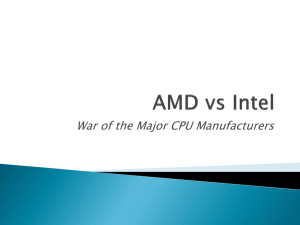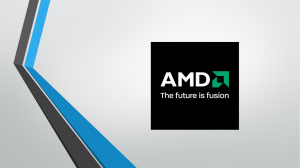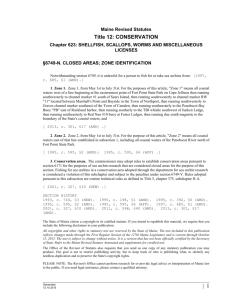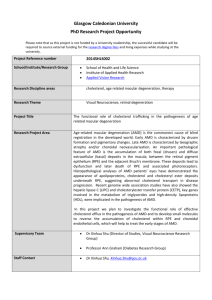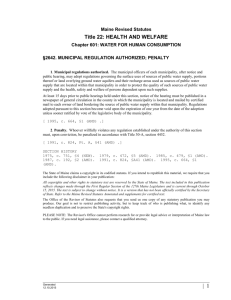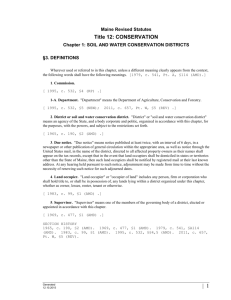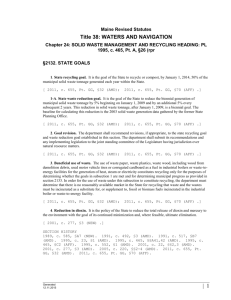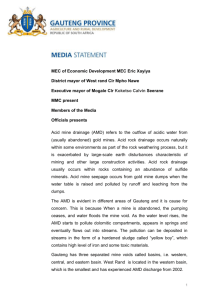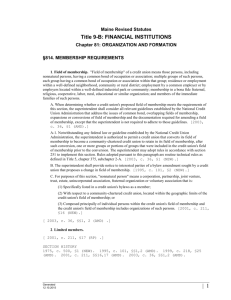here - Centre for Environmental Rights
advertisement
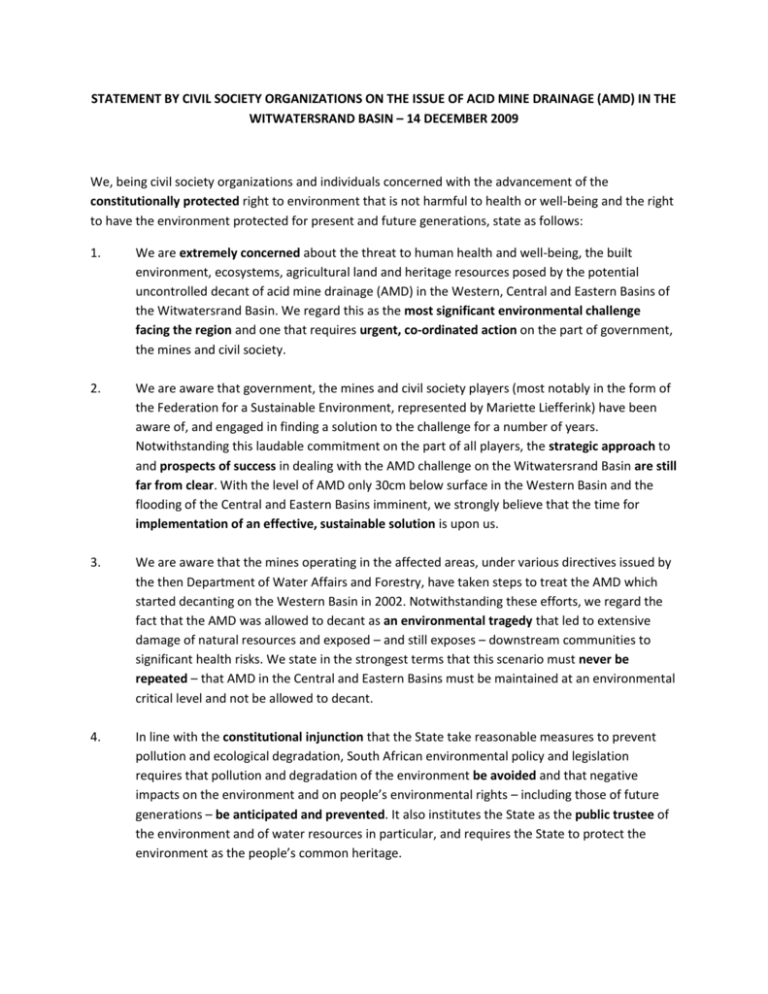
STATEMENT BY CIVIL SOCIETY ORGANIZATIONS ON THE ISSUE OF ACID MINE DRAINAGE (AMD) IN THE WITWATERSRAND BASIN – 14 DECEMBER 2009 We, being civil society organizations and individuals concerned with the advancement of the constitutionally protected right to environment that is not harmful to health or well-being and the right to have the environment protected for present and future generations, state as follows: 1. We are extremely concerned about the threat to human health and well-being, the built environment, ecosystems, agricultural land and heritage resources posed by the potential uncontrolled decant of acid mine drainage (AMD) in the Western, Central and Eastern Basins of the Witwatersrand Basin. We regard this as the most significant environmental challenge facing the region and one that requires urgent, co-ordinated action on the part of government, the mines and civil society. 2. We are aware that government, the mines and civil society players (most notably in the form of the Federation for a Sustainable Environment, represented by Mariette Liefferink) have been aware of, and engaged in finding a solution to the challenge for a number of years. Notwithstanding this laudable commitment on the part of all players, the strategic approach to and prospects of success in dealing with the AMD challenge on the Witwatersrand Basin are still far from clear. With the level of AMD only 30cm below surface in the Western Basin and the flooding of the Central and Eastern Basins imminent, we strongly believe that the time for implementation of an effective, sustainable solution is upon us. 3. We are aware that the mines operating in the affected areas, under various directives issued by the then Department of Water Affairs and Forestry, have taken steps to treat the AMD which started decanting on the Western Basin in 2002. Notwithstanding these efforts, we regard the fact that the AMD was allowed to decant as an environmental tragedy that led to extensive damage of natural resources and exposed – and still exposes – downstream communities to significant health risks. We state in the strongest terms that this scenario must never be repeated – that AMD in the Central and Eastern Basins must be maintained at an environmental critical level and not be allowed to decant. 4. In line with the constitutional injunction that the State take reasonable measures to prevent pollution and ecological degradation, South African environmental policy and legislation requires that pollution and degradation of the environment be avoided and that negative impacts on the environment and on people’s environmental rights – including those of future generations – be anticipated and prevented. It also institutes the State as the public trustee of the environment and of water resources in particular, and requires the State to protect the environment as the people’s common heritage. 5. We believe it is therefore incumbent upon the State to implement, or to approve the implementation of a regional solution that is technologically feasible, financially sustainable, socially equitable and in conformance with international standards in terms of health and environmental indicators. 6. While we fully endorse the polluter pays principle, we also acknowledge that its application in this particular context is difficult because of the historic failure to hold the mines accountable for their detrimental impacts on the environment. We fear that an approach that simply directs the relatively few remaining players in the gold mining industry to pay for the remediation of the entire problem into perpetuity might not be feasible, delay the process of finding a sustainable solution and ultimately lead to the State having to assume liability for pumping and treating AMD for an indefinite time – a situation which has already materialized on the Eastern Basin with the Pamodzi Mine. 7. We are aware that the mining industry has collaborated in preparing a definitive feasibility study for the establishment of a central water treatment plant – in the form of the Western Utilities Corporation (WUC) – designed to pump and treat AMD in the Western, Central and Eastern Basins to a potable water standard. We have been informed that while the documentation for the approval necessary for this project to proceed to the next stage has been submitted, to date the State has not provided a clear indication of its positive support. We are aware of and acknowledge criticism of the project on technological, political and ideological grounds and are keen to engage with government and the mining industry to find innovative solutions to elements of the proposal that may not fulfill the requirements of environmental sustainability, technological feasibility, financial sustainability and social equity. We are disturbed however that to date it is the only comprehensive solution in the public domain that may be able to address the immediate threat. We are very concerned that other proposals are not being disclosed and that an open and transparent public debate on the pros and cons of the various options is not taking place. 8. We therefore call upon the State, in its role as custodian of our precious and scarce water resources to disclose the various options to the problem of AMD in the Witwatersrand Basin it is currently considering, to engage with civil society in finding an effective solution to the problem, and to act with a sense of urgency so as to ensure that AMD in the Central and Eastern Basins is maintained at an environmental critical level and is not allowed to decant. Immediate action is imperative as it is estimated that AMD in the Central Basin will flood past the environmental critical level in the next 18 months. 9. We understand that a decision in these circumstances may appear politically daunting. However, at the same time, we regard the FAILURE to take a decision as a choice in itself for which we will also hold government accountable. For further information regarding AMD on the Witwatersrand, contact Mariette Liefferink at mariettel@iburst.co.za or mariette@pea.org.za. In order to sign the statement send your name, contact details and, where relevant, the name of your organization to amd.workinggroup@gmail.com. SIGNED: Mariette Liefferink, CEO, Federation for a Sustainable Enviornment, on behalf of the organisations listed below. Anti Privatisation Forum Birdlife Harties Centre for Environmental Rights Coalition Against Nuclear Energy Concerned Seringveld Association Earthlife Africa eThekwini Earthlife Africa Johannesburg Endangered Wildlife Trust Environmental Monitoring Group Escarpment Environment Protection Group Federation for a Sustainable Environment GeaSphere groundWork Hartebeestpoortdam Water Action Group Institute for Zero Waste in Africa (IZWA) Joburg Advocacy Group Johannesburg Anglican Environmental Initiative Lawyers for Human Rights Legal Resources Centre National Association of Conservancies/Stewardship South Africa North West Conservancy/Stewardship Association Pelindaba Working Group Potch Petitioners Public Environmental Arbiters Renosterspruit Nature Conservancy Save the Vaal (SAVE) Seringveld Conservancy South Durban Community Environmental Alliance The GreenHouse People's Environment Centre Wildlife and Environmental Society of South Africa Dr. Pieter Hermanus van Eeden A representative of EcoMonitor Professor Tracy Humby School of Law, University of the Witwatersrand Florian Kroll On behalf of the Wits Health Promotion Unit Vongani Lawrence Mashava Human Rights Activist
